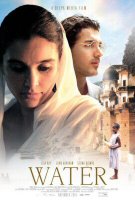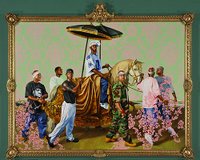 During my blog-fast I watched Water, a fabulous Indian film by Deepa Mehta. In the course of watching this film, several concepts converged at once which I am compelled to share.
During my blog-fast I watched Water, a fabulous Indian film by Deepa Mehta. In the course of watching this film, several concepts converged at once which I am compelled to share.
The first references back to a post by Anna on Sepia Mutiny. I really wanted to post in response to “Whoever you are, you are not alone” but I restrained myself and left three or so comments on the Mutiny’s blog instead. ;0) Basically, in a narrative style post, Anna shared her story about being sexually assaulted. Naturally, this led to an outpouring of emotional comments (200+) of various sentiments. Having also survived assault, I was totally floored by her willingness to share but even more appreciative of the open dialogue her admission initiated.
So back to Water, if you haven’t seen it, Suraj Imports in Nashville has a bootleg that says “For Screening Purposes Only” across the screen every 10 minutes that they’ll let you rent for $3...Basically, the story is about a colony of widows during the late ‘30s when the teachings of Gandhi were beginning to stir the undercurrents of Indian culture. At the time, the religious practice was that widowed women were to leave their families, live in the colony, keep their hair in a G.I. Jane cut, always wear white (the color of mourning), never wear jewelry. They were not permitted to work and had to beg. If that wasn’t bad enough, the oldest widow and her eunuch friend would pimp out the youngest widow. No big deal until it turned out the youngest widow was 7-years-old. [Child marriage produces child widows.]
“Dang! This is depressing,” thinks Current Reader. No worries. I’m getting to the point.
After watching Water and thinking about the general disenfranchisement of women as it pertains to me personally and in the worldwide sphere, I couldn’t help but think of Jesus. Seriously. In the very last scene of Water, one of the middle-aged widows takes the 7-year-old girl who was assaulted to hear Gandhi speak at the local train station. She presses through a crowd of people all while carrying this fairly large child. Gandhi speaks very briefly then boards the train. In a palpable convergence of fear, hope and desperation, the widow begins to press toward the train as the whistle blows. She runs toward the train crying out, “Please take her with you. Give her to Gandhi. Please!”
I was reminded of the bleeding woman who pushed through a crowd just to touch the edge of Jesus' clothing because she believed that if she touched him, she would be healed. Her faith, her desperation propelled her.
[Lk 8:43-48]
I am both the child--wounded and helpless--and the woman, desperate and reaching to get to the only thing that could possibly offer deliverance from the immobilizing weight of life.
One of my absolute favorite verses in the Bible says, "No one who trusts in you [God] will ever be put to shame, but they will be put to shame who are treacherous without excuse." [Ps. 25:3] Jesus was "a man of sorrows, and familiar with suffering," [Isa 53:3] I mentioned in a previous post how in Christ's first public message on earth he stated he came "to bind up the brokenhearted, to proclaim freedom." [Isa 61:1-2] Later in that same chapter it says, "Instead of their shame my people will receive a double portion, and instead of disgrace, they will rejoice in their inheritance...and everlasting joy will be there." [v.7]
 Life heaps so many things on us and leaves behind a residue of disappointment, frustration and shame but Jesus made a way for us to be free of every oppression life can bring--every shame, every frustration, every mistreatment has no place in His love. The Lord is a refuge for the oppressed, a stronghold in times of trouble. [Ps 9:9]
Life heaps so many things on us and leaves behind a residue of disappointment, frustration and shame but Jesus made a way for us to be free of every oppression life can bring--every shame, every frustration, every mistreatment has no place in His love. The Lord is a refuge for the oppressed, a stronghold in times of trouble. [Ps 9:9]
4/28 Update: The folks over at Reel Spirituality [Fuller U.] have posted a discussion guide for the film here.
 Okay, I just had to share this quote because it made me laugh. Even in the land of glamour, people gotta handle they bidness:
Okay, I just had to share this quote because it made me laugh. Even in the land of glamour, people gotta handle they bidness:









